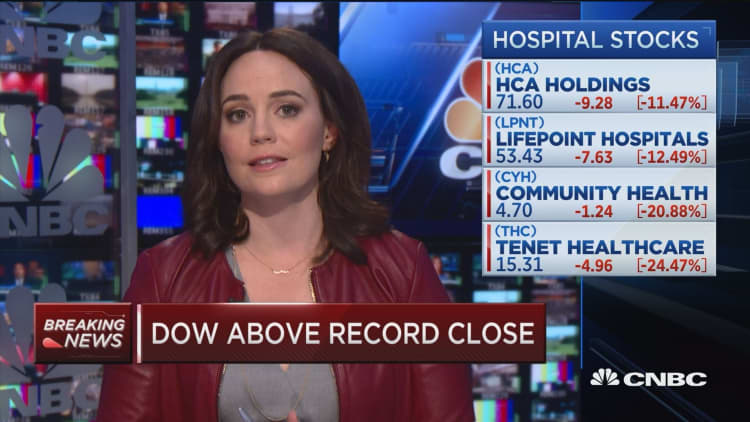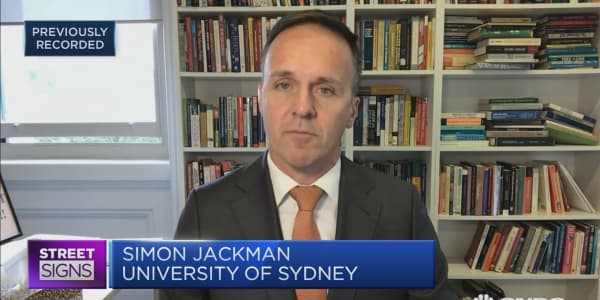In times of uncertainty, it's said "better the devil you know than the devil you don't."
Since the election, the prevailing sentiment in the drug industry has been just the opposite. The reversal of the old adage explains the industry's reaction to Donald Trump's election: a rally of almost 10 percent since Nov 8.
"It was not so much of an issue of, 'Well, we know what we're getting on both sides, and we prefer a Trump administration,'" said Ron Cohen, CEO of Acorda Therapeutics and executive committee chair of the industry group BIO. "It's that we're not exactly sure what we're getting with a Trump administration, and it's fairly clear what the implications would be of a Clinton administration."
What the drug industry expected under a President Hillary Clinton: a continued focus on drug prices, with potential legislative changes in the offing. The slide in biotech stocks, after a five-year runup, can be traced to Clinton's focus on what she called predatory pricing practices in the industry, including a September 2015 tweet in which she vowed to lay out a plan to take the drug industry on.
"The narrative during the election about biotech and pharma I think created what markets and many of us perceived as a political overhang on the value of our stocks and the value of innovation," said Jeff Jonas, CEO of Sage Therapeutics. "We all saw it had a very negative effect on the valuations of all of our companies."
Trump focused on Obamacare
"What's apparent to me as an observer is the lack of indiscriminate rhetoric about the industry," Jonas said. "Which gives me hope that the approach to drug development and the management of pricing will reflect sound business and economic principles, not political ideology."
Trump's plans for the drug industry are still distinctly unclear; his health-care policy outlines have focused more on the Affordable Care Act than on pharmaceuticals. And investors have seized on that lack of focus on drug prices, as well as Trump's tax positions, viewed as favorable to the industry.

Priorities specific to the drug industry, as laid out on Trump's presidential transition website, GreatAgain.gov, include to "advance research and development in healthcare," and "reform the Food and Drug Administration, to put greater focus on the need of patients for new and innovative medical products."
What does that mean exactly?
"The answer is: I don't know," Acorda's Cohen said in a Nov. 17 telephone interview. But with a Republican Congress as well, he said, "the industry is less urgently concerned about major new restrictive legislation that would amount to price controls, which is the main thing that has been concerning."
This is where Trump's position becomes potentially less industry-friendly, though no less murky.
Though he hasn't mentioned it recently, in January, Trump appeared to advocate for Medicare negotiating drug prices, something he suggested could save $300 billion. And a position paper on his campaign website, DonaldJTrump.com, includes as his seventh and final point on health-care reform, to "remove barriers to entry into free markets for drug providers that offer safe, reliable and cheaper products."
Pro reimportation of drugs?
Specifically: drug reimportation from countries where they're cheaper. This is a tenet most closely associated with Vermont Sen. Bernie Sanders, possibly the only person considered less friendly to the drug industry than Hillary Clinton.
"Reimporting drugs is importation of other countries' price controls on drugs," said Cohen. "It's essentially saying that the U.S. is really the last bastion of more or less free markets in biopharmaceuticals and we're going to abolish that and import Germany and Canada's price controls."
Or, more frankly, he continued, "you're going to take the last bastion of major investment in future drug innovation and you're going to crush it."
So, the policy implications of Trump's presidency on the drug industry specifically are unclear.
A tax holiday boost
Another area investors have focused on is taxes, particularly the suggestion that a tax holiday may be on the horizon. That would allow companies with lots of cash stashed overseas to bring it back to the U.S. at a lower tax rate. And this, in the eyes of biotech investors, means M&A.
"A repatriation holiday would increase large-cap company flexibility and could facilitate U.S. small/mid-cap biotech acquisitions," Jefferies analyst Brian Abrahams wrote to clients the day after the election.
And Evercore ISI's John Scotti promptly distributed data on the amount of cash held overseas by the industry's largest U.S. companies: $34 billion by Amgen, $25 billion by Gilead, $21 billion by Merck and $10 billion by Pfizer.
"The potential for repatriation will change the complexion of the small- and mid-cap biotech industry significantly," Sage's Jonas said last week. "We all recognize there's been a paucity of innovation in many areas in large pharmaceutical companies and the repatriation of cash from overseas will open the door to much more M&A activity."
This, plus the removal of the "political overhang" of the election, Jonas suggested, means general investors will return to the space, further boosting valuations.
Candidate Trump vs President Trump
So if the drug industry is flying high on the election results, what about the broader scientific community — much of which provides the foundational research supporting the medicines drug companies develop and bring to market?
"You could see a further de-emphasis on basic science, which is critical to support translational research," said Joel Dudley, an associate professor of genetics and genomic sciences and director of biomedical informatics at the Icahn School of Medicine at Mount Sinai. "If I'm speaking from my world of translational medicine" — part of the field that aims to turn discoveries into applications — "I'm not too worried."
But many scientists are. Much has been made of both Trump and Vice President-elect Mike Pence's anti-science statements — Trump has suggested climate change is a hoax perpetuated by the Chinese, while Pence claimed smoking doesn't kill in a 15-year-old op-ed.
"We must make clear that an official cannot wish away what is known about climate change, gun violence, opioid addiction, fisheries depletion, or any other public issue illuminated by research," Rush Holt, CEO of the American Association for the Advancement of Science, and executive publisher of the Science journals, wrote in a Nov. 17 editorial.
"We hope that President Trump will be more grounded in specific facts than was candidate Trump and pay more attention to the process of careful, open vetting of hypotheses and claims."
So less than two weeks out from the election, the implications are still unclear. Analysts warn 2017 may still be uncertain. And a repeal of Obamacare could cause tremendous disruption to the health-care system, depending on how it's done.
But the drug industry is just happy that, at least for now, the pressure's off.
"With respect to the biotech and pharmaceutical industry," Sage CEO Jonas concluded, "I'm encouraged simply by what we're not hearing."
(Correction: A earlier version of the story misstated Dudley's title. He is an associate professor of genetics and genomic sciences and director of biomedical informatics at the Icahn School of Medicine at Mount Sinai.)




